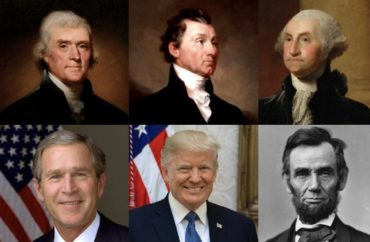
ANALYSIS: America celebrates all presidents, but many receive no love on college campuses
This President’s Day, The College Fix remembers the presidential victims of cancel culture on college campuses.
The Fix has compiled examples of campus cancel culture attacking presidential monuments, statues, building names and supporters.
This data was collected from The Fix’s Campus Cancel Culture Database, which “chronicles and quantifies cancel culture’s influence on higher education, tracking its targets and noting its successes and failures.”
Mary Grabar, author of “Debunking The 1619 Project,” explained to The Fix that “there has been so much focus on the sins of our past leaders that anyone who comes up short of meeting the woke standards of perfection is to be condemned and canceled.”
While the examples go back to America’s first president, George Washington, recent presidents have also been targeted.
One instance featured a student who was disenrolled from a graduate program at the University of San Diego for his pro-Trump stance, while another included the firing of a law instructor who tweeted favorably of the former president.
Out of all the presidents, Thomas Jefferson received the most hate, however. Several universities called for his statues to be torn down and his buildings renamed. Even when Hofstra University relocated a statue of Jefferson, students continued to complain.
One of the most prominent examples occurred at the University of Missouri where students demanded his statue be destroyed after calling him a “racist rapist.”
However this does not compare to George Washington whose statue was actually decapitated at George Washington University. Like the other presidents, he also received multiple calls for his statues to be torn down and for buildings named in his honor to be changed. Washington and Lee University agreed to remove the first president’s image from its diploma to appease activists.
James Madison and Abraham Lincoln also received numerous attacks on their monuments and memorials at universities.
MORE: UW-Madison campus exhibit criticizes Lincoln statue
For example, Cornell University at one time removed the Lincoln bust from the university’s library.
At George Washington University, student groups demanded the removal of Madison’s name along with Winston Churchill’s and James Monroe’s from university buildings.
Surprisingly, Andrew Jackson, commonly known for his ill-treatment of Native Americans, only has one documented instance of campus culture coming after him. It occurred at Stanford when American Indian Activists canceled an Andrew Jackson musical.
Other cancelations or attempts include: the University at Buffalo stripped Millard Fillmore’s name from a campus building, Dartmouth faculty protested an honorary degree given to President George H.W. Bush and University of California Berkeley professors called for the firing of John Yoo, a legal advisor to President George W. Bush and scholar on campus.
Presidents Calvin Coolidge and Gerald Ford have escaped scrutiny from campus activists, nor are there any entries in the database for Richard Nixon, though he may have fewer places named after him given how he left office.
While many of these presidents in this article received tremendous scrutiny from the Left, the same “does not apply to heroes of the left who may have been supportive of, or even participated in, crimes of Communists,” Grabar told The Fix.
Grabar attributed the lack of patriotism on campus to deconstructionism.
“Deconstruction is a school of interpretation that purportedly uncovers hidden meanings, but what it really does is cut down pillars of the past,” she explained.
Through this “ideological lens” students measure the nation’s heroes against an impossible standard that none can meet.
Grabar explained that while the current “target might be George Washington; tomorrow, it might be Barack Obama.”
Despite being one of the most liberal presidents in recent history, Obama’s officials have already received pushback. A former legal advisor to the president faced fire at the University of California for his opinions on drone strikes, while former Obama Secretary of Homeland Security Jeh Johnson has faced cancelation at University of Southern California and Vassar College for being too tough on immigration.
To prevent this downward spiral of cancelations, literature and history departments need to be revamped, Grabar said.
“The classical study of literature helps in gaining an understanding of human nature…,” she said. “In studying history, likewise, students need to be reminded that all human beings are flawed and live in a specific time and under circumstances that conscribe what they are able to do.”
Grabar cited examples of Shakespeare showing the depths and hidden recesses of human nature and its inclinations as well as provided the proper framework to bear in mind when studying history.
“If a president was a slave holder, students should learn about how widespread slavery was at the time, how he treated his slaves, what laws and practices of the time restricted his ability to free them, etc,” she said.
She cited Jefferson as an example, explaining that he “is just dismissed as a slaveowner without any attempt to understand the personal and historical context of his life.”
MORE: 85 times campus cancel culture took down speakers, scholars and more in 2022
IMAGES: WhiteHouse.gov
Like The College Fix on Facebook / Follow us on Twitter






Please join the conversation about our stories on Facebook, Twitter, Instagram, Reddit, MeWe, Rumble, Gab, Minds and Gettr.